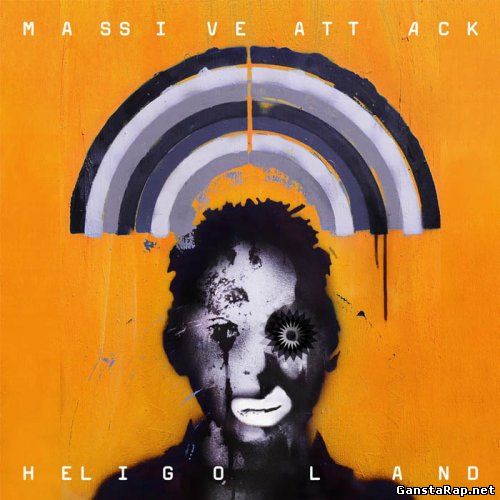
Massive Attack
Heligoland
[Virgin; 2010]
For their first three albums, you could count on Massive Attack to make music that was as intense as it was graceful. As the moods of their albums gradually transitioned from refined soul to grimy abrasion on Blue Lines, Protection, and Mezzanine, they used that balance to toy with the emotional structure of their sound. The result was some of the decade’s most haunting, forward-thinking music. Depending on how and when you listen, the same Massive Attack song can creep you out, fill you with sorrow, or send you into a deep reverie. The best ones do it all at once.
Many fans consider what little music Massive Attack released since Mezzanine to be a retreat of sorts, and it’s true that they may have lost something with each original member that split off– namely the hip-hop sensibility of Andrew “Mushroom” Vowles and the frigid snarl of Grant “Daddy G” Marshall. Their next release, 2003’s 100th Window, seemed like a creative holding pattern brought on by the group’s personnel situation, but it did have a few moments of sinister beauty. Heligoland– the first non-soundtrack Massive Attack album in seven years and the first with Daddy G back on board in 12– misses that quality. The undercurrent of menace and sadness that defined Massive Attack’s best music is largely absent, replaced with a drowsy, half-formed gloom that, if anything, suggests resignation instead of dread.
Last fall’s Splitting the Atom EP offered a couple of warning signs that reappear on this album. “Pray for Rain” is a woozy, overlong dirge redeemed only by Tunde Adebimpe’s rich voice, the only instrument that bothers with anything approaching dynamics. And the EP’s title track, which reunited the voices of Daddy G, Horace Andy, and Robert “3D” Del Naja over achy-kneed downtempo electro, just blithely rotates in place alongside a dead-eyed organ riff like a beat-to-shit merry-go-round. The potential of both these tracks– strong vocalists carrying a sense of weariness over bleak ambiance– is sabotaged by the music’s unwillingness to rise, crest, and fall, to shift momentum or volume, to do anything more than sulk in the background with its hands in its pockets, kicking at the ground.
That problem becomes more obvious throughout the rest of the album, especially when you’re hit with one of its exceptions. “Girl I Love You” is a bracing embodiment of everything that made those classic Horace Andy-fronted Massive Attack tracks so great: a half-Reznor, half-Gaye backbeat; ghostly filtered guitars and snarling blasts of brass; that exceptional voice transfusing vintage lover’s rock into harrowing cries for help. It completely annihilates nearly everything else on the album: the watery, choppy acoustic guitar loops that underpin Martina Topley-Bird on “Psyche”, which sound like something Dan Deacon would come up with if he was scared of being abrasive; the listless half-skank of Hope Sandoval spotlight “Paradise Circus”; the Damon Albarn-feels-sad moment “Saturday Come Slow”, which sounds kind of like Blur’s “Sweet Song” with all the hope drained out.
And note those names, 90s icons all– they’re a quick and easy shorthand if you need to point out how little Heligoland engages with current music. Since 100th Window, the post-hip-hop landscape of bass music has extrapolated into an endlessly creative nebula of dubstep, wonky, UK funky, Balearic, and other rich veins of style. And how does this album engage with it? By closing out with a track, “Atlas Air”, that sounds kind of like Aeroplane bliss-disco trying to be as creepy as the Knife. Elsewhere, we get a flimsy New Order pastiche (“Rush Minute”) and glitchy quasi-jungle (“Babel”) to show for it. Burial’s been given these tracks for a potential No Protection treatment, so there’s that, at least, but it’s a shame to think that it’ll take an outside producer to salvage this stuff rather than simply reinterpret it.
So what does an album this defeatist-sounding have to say? It just so happens to come at a time where defeatism feels pretty natural, and ironically that makes these songs feel even harder to relate to. When Daddy G mutters despairingly how there’s “No hope without dope/ The jobless return/ The bankers have bailed” on “Splitting the Atom” or Elbow’s Guy Garvey moans fearfully about home insecurity on “Flat of the Blade”, it feels of-the-moment– but part of a moment you want to break out of because the malaise feels suffocating. Anxiety is one thing, hopelessness is another entirely. And when your whole world can feel, in the words of “Pray for Rain”, like a “dull residue of what once was,” it’s probably better to wait for an album that can’t be described the same way.
— Nate Patrin, February 9, 2010
1. Pray For Rain (featuring Tunde Adebimpe)
2. Babel (featuring Martina Topley-Bird)
3. Splitting The Atom (featuring Robert del Naja/Grant Marshall/Horace Andy)
4. Girl I Love You (featuring Horace Andy)
5. Psyche (featuring Martina Topley-Bird)
6. Flat Of The Blade (featuring Guy Garvey)
7. Paradise Circus (featuring Hope Sandoval)
8. Rush Minute (featuring Robert del Naja)
9. Saturday Come Slow (featuring Damon Albarn)
10. Atlas Air (featuring Robert del Naja)
